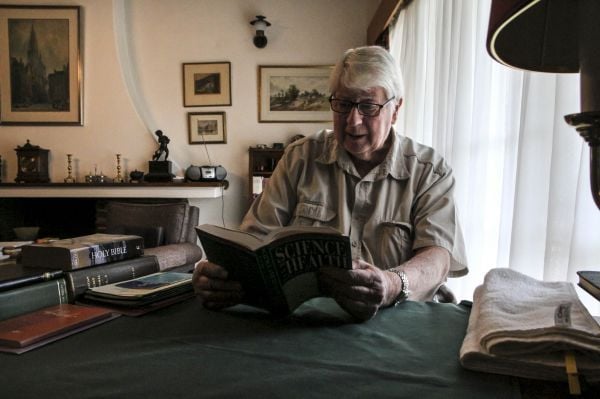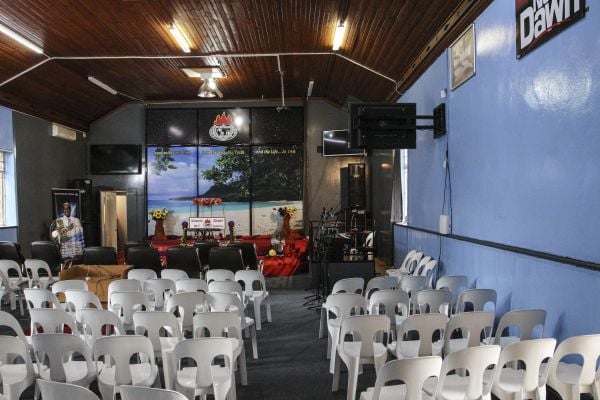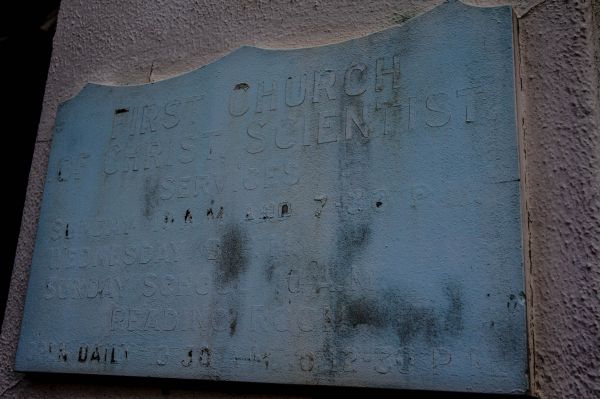Al Akhawayn University library. The university is located in Ifrane
“It was inevitable that the church was going to close.”
That is what Mark Harding, my 80-year-old grandfather, told me the last time I spoke to him.
The First Church of Christ, Scientist was situated off one of Kimberley’s main roads, Regiment Way. It had a curved facade, painted black and white, near one of the last remaining statues of Cecil John Rhodes, who is on a horse.
With its 12 pews, the church could seat 60 people, with a room for its Sunday school situated at the back of the building.
The morning light would filter in through the arched windows, and the dust would dance in the light on the wooden parquet floors.
There was a piano at the front door, which would fill the church with music before, during and after the service.
The first services were offered there in the early 1930s, my grandfather told me.
Families would park their cars in the side street or in the small car park adjacent to the church. In their Sunday best, parents and their children would enter the building from 27 D’Arcy Street. It would have an average congregation of 18.
His church never saw numbers like those of his wife’s, St Albans Anglican Church, which had about 60 congregants on a Sunday.
But as families moved away from Kimberley, First Church of Christ, Scientist’s congregation was reduced to 10 and, eventually, there were only two — my grandfather and Peace Khumalo, who would both host and attend the church services.
They tried to keep the services going. My grandfather provided recordings of sermons and hymns, with him and Mr Khumalo making up the entire congregation. But it was not enough to sustain the church.
“We were the only two left. There wasn’t any point to keep it open,” my grandfather said.

[Mark Harding reading the Science and Health with Key to the Scriptures by Mary Baker Eddy (Pamela Harding/M&G)]
The church offered its last service in 2003 before closing its doors. The hymnals, Bibles and other literature were packed into boxes and taken to my grandfather’s home.
Twelve Zimbabwean teak pews and the podium were lent to Kimberley’s McGregor Museum for 15 years, with the proviso that, if the church should ever reopen, it would reclaim the pews. But it never did.
“We never thought the church would reopen unless we were suddenly teeming with members,” my grandfather said.
The building was sold to C&N, an electrical hardware store. It would later be sold to a Kimberley branch of real-estate business Remax.
He and Mr Khumalo met infrequently for several months at my grandfather’s home in Monument Heights.
But it became too much for Mr Khumalo, then in his late 70s, to make the trek from his home on Nxumalo Street in Galeshewe into the centre of Kimberley.
“I used to drive into the location when he didn’t have transport, but then he stopped contacting me or coming,” my grandfather said.
“I haven’t heard from him in years. I don’t know if he is still alive.”
My grandfather continues to listen to the recorded sermons and to study religious texts, but now he does this alone.
Then, in 2015, things changed. The teak pews were replaced by plastic chairs. Instead of the podium, there is a stage. The piano has been replaced with loudspeakers, guitars and a set of drums.
Pastor Ben Okafor, the leader of the Winners International Chapel in Kimberley, brought music and God back to 27 D’Arcy.

(Pamela Harding/M&G)
Once again, sermons about the healing power of Jesus Christ and his love for humanity echoed in the building. People once again went there for comfort, healing and revelation.
Although it was 12 years later and the church was older, there was a fresh energy about it, because nothing could detract from the agelessness of the sermons within.
Kimberley has changed since I left at the end of 2002. It was once a sleepy town, known for the biggest man-made hole, diamonds and game farming.
Now, it has the Sol Plaatje University, which brings with it a bustling student community and a more metropolitan feeling.
Pastor Ben’s congregation reflects this growth, and over the past few years his church has grown. He has expressed his deep gratitude for being able and chosen to lead his congregation.
Going to the church today, two bright rectangular banners are hoisted up on the building, with an image of Pastor Ben’s face on them but if you look closely at the entrance, a faded bronze plaque can still be seen. It reads:

First Church of Christ, Scientist Services:
Sunday 10:00am and 7:30pm
Sunday School 10:00am
Reading Room Daily 10:30 to 12:30
Once again, the building has been placed back in the hands of God.